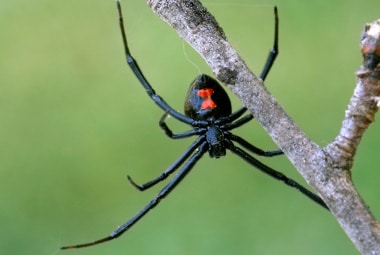
Black widow spiders can be found living throughout Missouri, and can be found throughout the rest of the United States as well. Despite their venomous nature they are a shy species and try to avoid contact with people as much as possible. Black widow spiders are a beneficial species because they help to keep populations down of other spider species and nuisance insects by feeding upon them.
| Pest Identification | |
|---|---|
| Recognition | Black widow spiders are shiny black in color and have a red “hourglass” like shape on their back. They can also have lighter red or white spots on their abdomen as well. Like all arachnids they have four pairs of legs. Adults can range in size from 1 ½ – 1-3/8 inches in length and the females are larger than males. |
| Biology | The female black widow spider lays her eggs (25-900) and creates an egg sac to keep them safe in. After mating the females will generally kill the male, any remaining males and all females will die by the first freeze. Egg cases that overwinter will hatch in the spring to start the next year’s life cycle. After the young emerge from the eggs they mature for the next 2-3 months, molting 3-8 times until they reach adulthood. Only the female black widow is venomous. Males are hardly seen and are completely harmless to a person. The venom from a black widow spider affects the nervous system of the victim. Symptoms can occur quickly and include vomiting, difficulty breathing, chills, perspiration, stomach cramps, and other pains. The bite site generally does not swell but a person’s eyelids, hands, and feet can, depending on the severity of the reaction. A bite from a black widow spider is serious but rarely leads to death. |
| Habits | Female black widow spiders build irregularly shaped webs that they rarely leave. These webs generally contain a small funnel that they spider uses to hide in if she feels threatened. Male black widow spiders do not build webs. Black widow spiders can be found building their webs in between flat rocks, in logs or outbuildings, and near foundations. They can accidentally move inside of houses through cracks in foundations, air conditioning units, or underneath of doors while searching for prey and shelter. Inside they hide in quiet, dark and undisturbed areas like closets, basements, attics, crawl spaces, and underneath furniture. |
| Prevention | Utilizing a professional home pest control and prevention program is the optimum way to prevent black widow spiders from entering into your home or making your property a place that they desire to live. There are, however, some simple things that you can do to help stop back widow spiders from entering into your home. Sealing cracks and crevices in the buildings foundation, installing door sweeps, caulking around windows and doors, and repairing or replacing insect screens in windows and doors will limit places that they use to come inside. It is also important to keep clutter to a minimum in storage areas, properly close-up outbuildings, and before putting on clothing or shoes shake them out to dislodge any hiding spiders. |
| Professional | The best way to safely control black widow spiders is with the help of a professional. Here at Rottler Pest & Lawn Solutions, our highly trained technicians applying a residual liquid insecticide around the foundation perimeter, molding, and trim, and under eaves, low siding, patio, deck and chimney attachments. We also treat mulch and other landscaping as necessary. All outbuildings, including sheds and garages, will be treated as well. Indoor insecticides may be used in basements, attics, and other conducive areas such as closets and baseboards. We may use sticky monitors and traps to help reduce the number of spiders inside. Having a year-round residential pest control program in place not only will help with black widow spiders, but will also help to control other common insects that spiders feed on. |

